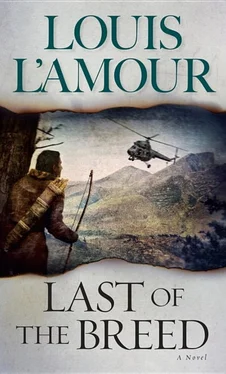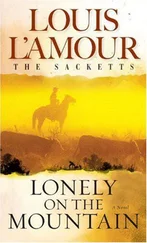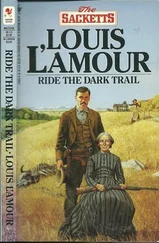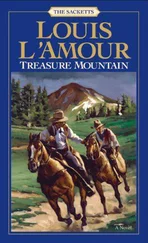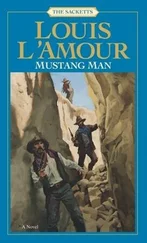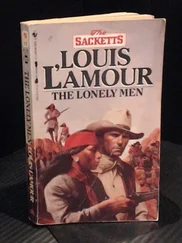Louis L'Amour - Last of the Breed
Здесь есть возможность читать онлайн «Louis L'Amour - Last of the Breed» весь текст электронной книги совершенно бесплатно (целиком полную версию без сокращений). В некоторых случаях можно слушать аудио, скачать через торрент в формате fb2 и присутствует краткое содержание. Город: New York, Год выпуска: 2010, ISBN: 2010, Издательство: Random House Publishing Group, Жанр: Триллер, Историческая проза, Приключения про индейцев, на английском языке. Описание произведения, (предисловие) а так же отзывы посетителей доступны на портале библиотеки ЛибКат.
- Название:Last of the Breed
- Автор:
- Издательство:Random House Publishing Group
- Жанр:
- Год:2010
- Город:New York
- ISBN:978-0-553-89935-1
- Рейтинг книги:3 / 5. Голосов: 1
-
Избранное:Добавить в избранное
- Отзывы:
-
Ваша оценка:
- 60
- 1
- 2
- 3
- 4
- 5
Last of the Breed: краткое содержание, описание и аннотация
Предлагаем к чтению аннотацию, описание, краткое содержание или предисловие (зависит от того, что написал сам автор книги «Last of the Breed»). Если вы не нашли необходимую информацию о книге — напишите в комментариях, мы постараемся отыскать её.
Last of the Breed — читать онлайн бесплатно полную книгу (весь текст) целиком
Ниже представлен текст книги, разбитый по страницам. Система сохранения места последней прочитанной страницы, позволяет с удобством читать онлайн бесплатно книгу «Last of the Breed», без необходимости каждый раз заново искать на чём Вы остановились. Поставьте закладку, и сможете в любой момент перейти на страницу, на которой закончили чтение.
Интервал:
Закладка:
The idea was simple enough. Locate and seize certain key personnel, bring them to this camp, a place known to only the most powerful figures in the Politburo, secure what information their prisoners had, and then get rid of them. The disappearances would be few, isolated, and seemingly unrelated. The possibility of suspicion being aroused was almost nonexistent.
Operations had begun two years before with the seizure of a warrant officer, a very minor figure who, in the normal progress of his duties, had come into possession of some key information. That had been a modest success. Then the chemist Pennington…
When Colonel Zamatev looked into the eyes of his newest prisoner he was angered. The blue-gray eyes were oddly disconcerting in the dark, strongly boned face, yet it was the prisoner’s cool arrogance that aroused his ire. He was unaccustomed to find such arrogance in prisoners brought to him for interrogation. It was not arrogance alone, but a kind of bored contempt that irritated Zamatev.
Colonel Zamatev had a dossier before him that he believed told him all he needed to know about the man before him.
A university graduate, an athlete who had competed in various international tournaments, a decathlon star of almost Olympic caliber. He had scored Expert with a dozen weapons while in the Air Force and was reputed to be skilled in the martial arts. This was straightforward enough, and there were many other officers in the Army, Navy, and Air Force whose dossiers were little different, give or take a few skills.
As much as Zamatev knew about the American flyer, there was an essential fact he did not know. Beneath the veneer of education, culture, and training lay an unreconstructed savage.
When prisoners were brought before Colonel Zamatev they were frightened or wary. They had all heard the stories of brainwashing and torture, yet there was in this man no evidence of fear or of doubt in himself. Zamatev was irritated by a faint, uneasy feeling.
“You are Major Joseph Makatozi? Is that an American name?”
“If it is not there are no American names. I am an Indian, part Sioux, part Cheyenne.”
“Ah? Then you are one of those from whom your country was taken?”
“As we had taken it from others.”
“But they defeated you. You were beaten.”
“We won the last battle.” Joe Makatozi put into his tone a studied insolence. “As we always shall.”
“You would defend a country that was taken from you?”
“It was our country then; it is our country now. Our battle records, in every war the United States has fought, have been surpassed by none.”
Zamatev’s irritation mounted. He prided himself on an unemotional detachment, and his manner of interrogation was based upon a casual, seemingly friendly attitude that disarmed the prisoner, who, before he realized it, was trying to reciprocate. The American’s arrogance was making this approach difficult.
Zamatev also had an uneasy feeling that within seconds after entering the room Makatozi had assessed all it contained, including himself.
Zamatev had based much of his planning for the preliminary interrogation on the fact that Makatozi was of a badly treated minority.
In an effort to turn the interrogation into preferred channels, Zamatev indicated a thick-set, powerful man sitting quietly on the bench watching Makatozi through heavy-lidded eyes.
“As an American Indian you should be interested in meeting Alekhin. He is a Yakut, a Siberian counterpart of the American Indian. The Yakuts have a reputation in the Soviet. We call them the iron men of the north. They are among our greatest hunters and trackers.”
Zamatev returned his gaze to the American. “It is the pride of Alekhin that no prisoner has ever escaped him.”
Joe Mack, as he had been called since his days of athletic competition, glanced at the Siberian, and the Yakut stared back at him from flat, dull eyes of black. A small blaze of white where the hair had lost color over an old scar was his most distinguishing characteristic. He exuded the power of a gorilla and had the wrinkled, seamed face of a tired monkey until one looked a second time and recognized the lines for what they were, lines of cruelty and ruthlessness. Nor, despite his weathered features, was he much older than Joe Mack himself.
With deliberate contempt Joe Makatozi replied, “I don’t believe he could track a muddy dog across a dry floor!”
Alekhin came off the bench, a single swift, fluid movement, feet apart, hands ready. Joe Mack turned easily, almost contemptuously, to meet him.
For an instant Zamatev had a queer feeling that a page of history had rolled back. Suddenly, in his small, bare office, two savages faced each other, each a paragon of his kind. A thrill of excitement went through him, and for a moment he was tempted to let them fight.
Zamatev’s voice was a whip. “Alekhin! Sit down!”
His eyes went to Joe Mack. “Understand your position, Major. You are our prisoner. You are believed to be dead. So far as your country is concerned, you and your plane were lost at sea. No inquiries have been made, nor are any likely to be made.
“If you are to live it will be because I wish it, and your future, if any, depends on your replies to my questions. I will accept only complete cooperation, including a complete account of your operations as pilot of several varieties of experimental aircraft.
“You are an intelligent man, and I shall allow you twenty-four hours in which to consider your position. If you are reasonable you may find a place of honor among us. You will be permitted to retain your rank and the privileges pertaining to it. You can serve us, or you can die.”
“When was a traitor honored anywhere, even among those who profit from his betrayal? You waste your time, Colonel Zamatev.”
The Russian was startled. “You know me, then?”
“We also have our dossiers, Colonel.”
Zamatev was shaken by cold fury, but he forced himself to remain calm. “You are married, Major?”
“No.”
“Your parents are living?”
“No.”
“How old are you?”
“Thirty-one.”
Colonel Zamatev shuffled papers on his desk. “To your country, Major, you are already dead. To us you may yet be useful. A man of your talents can do well here, and you do not appear to be a man who would willingly choose death. At home you have no ties.”
“You forget the most important one, Colonel. There is my country.”
Zamatev spoke to Suvarov. “Return this man to his quarters, Lieutenant. I shall speak to him again after he has had time to consider his position.”
When they had gone Zamatev leaned back in his chair. He prided himself on his detachment, yet there was something about this particular American that irritated him. Perhaps it was the man’s total lack of fear, even of uncertainty. Yet was that normal? Was it not natural to fear in such a situation? To be wary? Uncertain? Worried? Major Makatozi showed no signs of apprehension, and at the brief meeting in this office he had seemed completely at ease. What was it about this man?
He was an Indian. What did that mean? Zamatev made a mental note to learn something about Indians. He was part Sioux and part Cheyenne. He made a note of the names. Yet he had blue eyes. Some white blood, too?
He took Makatozi’s dossier from his file and glanced through it. The man was a daring flyer, a superb pilot. He had both skill and judgment. He had gone to college on an athletic scholarship, one means of paying an athlete without appearing to do so. They had such situations in Russia as well, but in Russia they played for the country rather than for a college.
The Makatozi Project had been his most daring, and his superiors would expect results. So far they had given him much freedom of action but there were those who wished to take over the entire operation. Success was imperative in both the Pennington and the Makatozi operations, and his plans had been carefully laid. His earlier ventures, in which he had been tentative, testing, feeling his way, had been uniformly successful. Pennington, his first venture into deeper waters, had not been a well-known man. Indeed, few outside of a limited circle had any idea what he was doing. Something in chemistry, they believed. He had always had a bent in that direction. Only three men in England knew that one of his projects had achieved a startling breakthrough, and that one aspect of the breakthrough could revolutionize chemical warfare.
Читать дальшеИнтервал:
Закладка:
Похожие книги на «Last of the Breed»
Представляем Вашему вниманию похожие книги на «Last of the Breed» списком для выбора. Мы отобрали схожую по названию и смыслу литературу в надежде предоставить читателям больше вариантов отыскать новые, интересные, ещё непрочитанные произведения.
Обсуждение, отзывы о книге «Last of the Breed» и просто собственные мнения читателей. Оставьте ваши комментарии, напишите, что Вы думаете о произведении, его смысле или главных героях. Укажите что конкретно понравилось, а что нет, и почему Вы так считаете.
